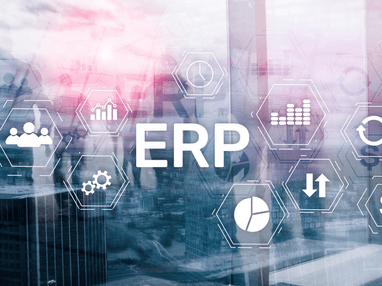The last five years have seen many businesses undergo a digital transformation. There are new ways of working, new tools, new systems and this can create a gap between existing technical knowledge and the level of knowledge that’s needed.
For many businesses, ERP has been at the centre of their transformation. That’s because the most effective way to streamline operations and create a centralised data platform is by implementing ERP.
Data shows the total ERP market size will reach $147.7 billion in spending by the end of this year. It’s a fast-moving market and one that will only continue to grow.
For job seekers, that means more opportunities and new career paths.
As we move into 2026, we’ll see more ERP platforms develop and existing platforms expand, resulting in an increased demand for ERP services and professionals to help embed this essential way of working into more businesses.
What Is ERP and Why It Matters
Enterprise Resource Planning, or ERP, is a software that brings together key business processes from finance to HR. From manufacturing to supply chain and procurement into one system. The goal of ERP is to create efficiencies and streamline business operations.
By pulling everything into one central place, the ERP becomes the nervous system of a business and ensures everyone has the information they need, when they need it. For scaling or international businesses, ERP connects individual teams or divisions and ensures all areas of the business are connected.
As it stands currently, there are three main types of ERP software: on-premise, cloud and hybrid. The leading platforms are SAP S/4HANA, Oracle NetSuite ERP, and Microsoft Dynamics 365, though it's highly likely that, given the growth in demand, there will be further developments and new platforms.
Key ERP Career Paths and Skills
As demand grows for ERP systems, there are more career opportunities opening up.
There are common roles within ERP which crop up time and time again. Here’s a quick rundown:
ERP Consultant: Working directly with a business, ERP consultants create and implement systems for that business. They manage the implementation to ensure they perform as intended and coach staff through the organisational change needed to embed the system.
Functional Analyst: This role links the end users and the technical teams to ensure the ERP system is doing what it’s meant to be doing. This role is to maximise the value of an ERP system through the implementation, maintenance and usage.
Technical Developer: Specialising in the technical side, this role focuses on the customisation, development, implementation and maintenance of ERP software. It doesn’t just relate to implementation, but also ongoing work such as developing reports, tweaks and adjustments and updating guidelines.
Project Manager: Often working from start to finish, the Project Manager oversees the whole project, including planning, execution and delivery. From defining the project objectives to rolling out the system, the Project Manager is responsible for it all. This role requires a detail-focused mindset with bigger-picture thinking.
Integration Specialist: ERP’s don’t exist in isolation. They connect systems and pull data from other sources. Integration Specialists ensure the seamless integration with other business software and systems to ensure a smooth data flow.
For those looking to move into ERP there are essential skills necessary to apply for ERP job roles on top of specialist system knowledge. These essential skills include:
-
system configuration
-
business process mapping
-
data migration
-
stakeholder management
These may seem a wide range of skills, but ERP consultancy is as much about integrating into a wider business and a holistic understanding of business operations, as it is about the technicalities that come with setting up a system. Having a firm handle on the business side is as important for many hiring managers as specific technical skills.
How Recruitment Businesses Can Support ERP Hiring
With demand for ERP specialists rising, it’s essential for candidates to have the right support and guidance. Recruitment businesses can support job seekers throughout the ERP hiring process.
Hiring Top Talent
To effectively implement ERP systems, it’s key to have the right talent in place. That talent will vary depending on the system you choose and your specific business. Sourcing ERP specialists with platform-specific expertise, such as SAP S/4HANA or Oracle Cloud, can be a challenge.
Recruitment businesses have the networks and contacts to discover opportunities for ERP specialists. When you work with a recruitment business that understands your specific skillset and the career path you’re looking for, it’s easier to find those niche roles you’re looking for.
Supporting Tech Investment
Implementing ERP isn’t a small investment. For a mid-sized business, it can range from $150,000 to $750,000. That’s a sizeable investment that needs to come to fruition. Recruitment businesses know who is making that investment, who’s looking for support and who is looking for your particular skillsets.
Upskilling Internal Teams
Working with contractors and bringing in talent when needed is one way to access specialist skills, but it’s also essential to create training pathways to upskill and educate internal teams. For anyone in-house looking to build a long-term career where they are, then bringing in a recruitment partner to work with internal teams on creating those training pathways and workforce planning, building in capability and capacity to internal teams that smooth the way for long-term success.
When it comes to successful digital transformations, ERP is a core component that can’t be ignored. Now is an exciting time to embark on a career in ERP, and recruitment partners can ensure your career is in safe hands.






